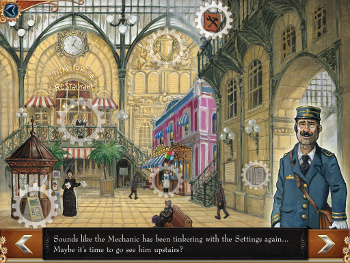Monthly Archives: May 2011
I tardily mention that my video introduction to modern IF makes a guest appearance (alongside a salient M.C. Frontalot video) in Juhana Leinonen’s online demonstration of Vorple, a JavaScript UI library for browser-based IF that he plans to finish and release later this year. In his own words:
Vorple aims to provide a simple way for IF authors to
- add elements that the underlying authoring system might not support, from custom fonts to animation effects to YouTube videos
- access external user interface elements from the game and let the game react to user’s actions in the user interface
- modify the web interpreter’s look and feel for the game’s purposes
- provide supplementary material within the game’s web presentation (manuals, hints, links, maps, feelies etc).
Another goal is to enhance the web interpreters with capabilities like folding away illegal commands, transcript recording, and easy embedding inside other web pages and services. The player would be provided with a set of widgets they could use during the game, for example a notepad or mapping tools.
The tiny demo shows off a number of these features, along with some other very impressive bits of IF-appropriate chrome. Make sure to EXAMINE LAMP and then watch subsequent commands’ text flow around the resulting illustration — sexy stuff.
Tags: if, interactive fiction.
Let this serve as my public announcement that I plan to attend the 2011 Origins Game Fair in Columbus, Ohio from June 22nd through the 26th. I’ll be acting a little bit as a blogger, a little as an indie game producer, and a little as a courier (helping to lug a publisher friend’s sellable goods cross-country). But mostly I plan to arrive as player and lover of games. This will be my fourth Origins, but the first where that’s my primary role.
Tags: conferences, looney labs, origins, pax.
Speaking of Kickstarter game projects involving children and mortal peril, Boston-based Lantana Games succeeded in their fundraising effort to complete Children of Liberty, a young-adult historical-fiction stealth platformer. Colonial America is a rich thematic source that games haven’t explored much, and I’m happy see this project funded. So here’s us also wishing the Lantana folks all the best while they screw on their tricorns and get down to business.
Tags: boston, kickstarter.
Wiley Wiggins, semi-obscure movie star and aficionado of semi-obscure adventure games, has co-founded a team to create Thunderbeam!, an iPad adventure. They aim to capture the spirit of the compelling — and, in retrospect, often disturbing — young-adult adventure-dramas they watched on TV as kids, particularly anime such as Gatchaman (or, as I knew it, Battle of the Planets) and live-action shows like The Third Eye.
Add in an original soundtrack by theremin-enhanced indie rockers The Octopus Project, and you’ve got me desperately mashing a ten-dollar bill into my laptop screen before remembering how Kickstarter works. Happily, they met their funding goal while I was in the middle of writing this post, but the drive remains open for another 11 days, and every dollar helps; I just zapped them a sawbuck in the correct manner.
The team’s website features a lengthy video about the game, interspersed with clips from the various games and TV shows that inspire them. (What crazy show is that completely earnest “Hitler isn’t dead” line from? Were I chewing gum I would have choked on it right then. That is some transcendently bizarre television, which I apparently missed for growing up on the wrong side of the pond).
I must admit some concern about their telling the whole world in lurid detail about the game’s emotional plot twists this early in the project. In my experience, talking too loudly about your work’s actual content — versus revealing teasing glimpses of the shadows said content casts — can sap one’s drive to ship the final product to an audience that has no idea what’s about to hit it. You can trade some of that away for the short-term boost of people telling you how cool your idea sounds, and arguably this isn’t a terrible idea when it comes to collecting Kickstarter pledges. But you need a lot of creative fuel in your tank for the long, long drive towards shipping, so I still advise caution.
Still, just given the talent involved and their clear love for the source material, I feel optimistic that this project will land in the right place. Best of luck from the Gameshelf to Karakasa Games!
Tags: adventure games, ipad, kickstarter.
Just noticed this Inform 7 Cheat Sheet designed by Mark-Oliver Reiser. It’s actually a few sheets long, but it covers an awful lot of ground. The front page presents a minimal primer on the language’s syntax and the standard library’s class tree, and from there it manages to compress most every major point of Writing with Inform (the IDE’s built-in documentation) down to four pages.
The effect unavoidably resembles a progammer’s complement to the world-famous IF players’ reference-on-a-postcard, and that is not a bad comparison to invite. If you’re planning on sweating over hot interactive fiction compiler this summer (and I can think of at least one reason why you might be), this guide seems well worth the price of five blank pages and a staple.
Tags: if, inform, interactive fiction, programming languages.
 Delighted to discover this USPS stamp design, depicting a quietly romantic moment between one of western culture’s most cherished (if occasionally cursed) couples, during today’s post office errand. It was designed by Derry Noyes and Jeanne Greco.
Delighted to discover this USPS stamp design, depicting a quietly romantic moment between one of western culture’s most cherished (if occasionally cursed) couples, during today’s post office errand. It was designed by Derry Noyes and Jeanne Greco.
Sure, like all their court, they have a reputation for fickleness. But isn’t it always nice to see them together like this anyway?
Tags: art, card games, love.
We learn today that the casual-MMO Legends of Zork is shutting down, two years after launch:
It is with a heavy heart we announce that Legends of Zork will be closing its doors to adventurers from noon BST (GMT +1) Tuesday 31st May 2011.
We all know that development work has been scarce of late: We have tried to find leeway within a work intensive schedule to devote some time to fixing the issues in the game; We have tried to find time to create new content for the community; But on the whole we have been unable to undertake any major work on the game.
(-- from a post on the Jolt Online forums, May 24th 2011)
(Thanks jizaboz and brasslantern for the tipoff.)
Tags: crpgs, if, legends of zork, mmos, zork.
 Writing the lead graf of yesterday’s post on L.A. Noire felt vaguely familiar, but I failed to dig any deeper at the time. Afterwards, reading Amanda Cosmos’ tweet about making her videogame police detective swerve drunkenly around the city in his patrol car gave me pleasant memories of Deadly Premonition. This led to my recollection of the last time I proclaimed the presence of an immersive, non-psychopathic adventure game — only two months ago.
Writing the lead graf of yesterday’s post on L.A. Noire felt vaguely familiar, but I failed to dig any deeper at the time. Afterwards, reading Amanda Cosmos’ tweet about making her videogame police detective swerve drunkenly around the city in his patrol car gave me pleasant memories of Deadly Premonition. This led to my recollection of the last time I proclaimed the presence of an immersive, non-psychopathic adventure game — only two months ago.
This feels especially embarrassing to me since I tend to so easily criticize the typical game-enthusiast forgetfulness of everything they’ve ever played and enjoyed, in favor of all the shiny, shiny unplayed (and unpurchased) titles tantalizing them. And here I have fallen into the same trap, and in full view of the public! Dreadful.
My penance, at least, is clear: per the conclusion of my first post on Deadly Premonition, I must eat through the rest of that game and then write further about it. While I have reached its ending, I know that I missed a whole lot of midgame content, due to my lack of understanding about why the game placed story-advancing scheduled events so far apart from each other on the clock. My York spent a lot of time chain-smoking in order to speed that clock up and get to the next piece of story, unaware of all the side-stories we were missing.
So, before I visit Los Angeles to get really good at analyzing the corners of peoples’ mouths, I’ve got to spend some more time tooling around Greenvale, looking for flowers in the rain.
Image by “maurrokh,” available on this T-shirt.
Tags: deadly premonition, digital games.
I have long been holding out hope for an immersive, Rockstar-style adventure game featuring a protagonist who was something other than a violent psychopath. I did not assume that Rockstar itself would be the source of this game, so I didn’t pay much active attention to L.A. Noire’s release.
With surprise and interest, then, did I read how C.E.J. Pacian, author of Gun Mute and other recent works of experimental text-game excellence, bought an Xbox console just to play L.A. Noire. It’s early yet, but he seems to be having fun with it:
First I accused the only witness of lying and she stopped speaking to me. Then, driving away from the crime scene, I crashed straight into a shop front. Getting out to make sure that none of the people who ran away screaming were hurt, I stepped in front of a car and was knocked down. Now confident that no-one was injured (except me) I then got back in my patrol car and proceeded to reverse over the body and fail the case.
Shortly after that, I was promoted to the traffic division.
Tags: digital games, if, interactive fiction, reax.
A few days ago I finally activated the long-dormant @TheGameshelf Twitter account, setting it up with Twitterfeed so that it automatically tweets links to new Gameshelf stories. If you love Twitter and you dig this blog too, do consider giving it a follow. [1]
[ The remainder of this post sinks into blogging-philosophy ruminations. Feel free to skip, or read the rest and play spot the tenuous connection the author draws to games. ]
Tags: administrivia, twitter.
And now, the part where I review DASH and BAPHL (spring 2011 editions). Okay, not really review. The part where I call out some interesting aspects of each, and compare them. Because I like it when game design improves over time.
Tags: baphl, boston, dash, if, interactive fiction, mystery hunt, puzzle hunts.
According to Wikipedia, Texans have long considered the dominoes game called 42 their very own statewide pastime. Texas State Rep. Erwin Cain has successfully led an effort to make this official, introducing his bill on the State House floor with an original bit of charming doggerel recapitulating the game’s traditionally accepted history:
Using double six dominoes in 1887
They created this holy game
Or rather it fell straight from heaven
Our blessed 42 with now such wide acclaimNo game of chance is this
As in cards, roulette or dice
For skill it takes in this game of bliss
Not so for those games of vice
(The full text is up at Purple Pawn.)
I get a kick out of this for a couple of reasons. For one thing, I like stories about the ingenious compromises people make when they wish to adhere to strict religious traditions while also satisfying their earthly desire to play a good game with friends and family. Rep. Cain seems to subscribe to the notion of dominoes as wholesome alternatives to the cards and dice that certain stripes of Christian culture proscribe as devilish — regardless of their functional similiarity! It reminds me also of observant Jews’ use of bookmarks to keep score during the Sabbath (the day of rest that forbids activities resembling labor, including writing). This creative tiptoeing through the sacred rulebooks in order to get some good games in strikes me not at all as shallow, but rather a beautifully human way of approaching the ineffable.
On a more material level, I always enjoy learning about the folk tabletop games associated with different parts of the United States. It seems that every nameable geographic/cultural region across the country has at least one game that it calls its own. The relationship between 42 and Texas is news to me — as is 42 itself, since domino games, so prevalent in the American south, remain alien to this Yankee. The child of Downeast Mainers, the table games I grew up with all involved one of those sinful card decks, with Cribbage chief among them. My friends of a more Midwestern bent, on the other hand, tend to be veteran Euchre players.
Do any studies exist on these sorts of regionally fastened games across America? One imagines this to be a subject as trackable as spoken dialect — and at least as interesting, as far as I’m concerned.
Tags: dominoes, folk games, history, religion, tabletop games.
Kill Screen magazine, the praises of which I have sung before, recently started publishing game reviews on the web. Despite my open disgust with mainstream reviews, I’ve been so far reading and enjoying this welcome alternative review source in silence. Today, a review by J. Nicholas Guest of Infinity Blade forces me to shout and point.
I’m not sure I’ve seen a review quite like this before, a piece of animated and (lightly) interactive text-art sharing a thematic groove with the work it addresses. It strikes me as possessing a digital version of what makes Mathew Kumar’s zine exp. worth reading, but I won’t otherwise spoil it for you. Block out 20 minutes and have a look.
(There does lurk an interesting — if surely coincidental — confluence between this review and Zarf’s The Matter of the Monster, eh?)
The indie studio responsible for two of my favorite recent adventure games, Ben There, Dan That and Time, Gentlemen, Please, has changed its name away from “Zombie Cow Studios”:
The trouble with picking a ‘funny’ name for your company, as I’ve discovered, is that it gets exponentially less funny with time. It was awkward to say out loud in front of grown-ups, and it made my heart sink every time someone mentioned the name of my company. That’s no way to go through life!
So here you have it: welcome to SIZE FIVE GAMES.
Right on.
If you dig adventures and toilet humor as much as I do, you really must play the two Ben & Dan games, by the way. The whole field of comedic Lucasarts-style adventures has been quite tired for a long, long time, but I found these games to rise above it. (Even as they sink far, far lower than many of their contemporaries have dared.) Greg Costikyan sums it up well in this review.
Tags: adventure games, if, indie games.
Adam Thornton has published StiffyMakane.com, a simple website tracking the checkered past of one of modern IF’s most resolutely recurring characters.
Mr. Makane originated from the turgid imagination of an adolescent Mark Ryan in 1997. It was not a very good game — for starters, it famously lets the title character drop his own genitals on the floor and walk away — but it somehow struck a chord with the burgeoning IF community. Stiffy has since then appeared in several text-adventure sex comedies from multiple authors, culminating this year in both Thornton’s own Classical-era epic Mentula Macanus: Apocolocyntosis (praised by Emily Short as a rival to Graham Nelson’s genre-defining Curses), and Sam Kabo Ashwell’s The Cavity of Time, a choose-your-own-adventure work authored in Undum.
The original games aren’t necessarily worth your time to play through (the added blunt humor of the “MSTified” take on Ryan’s original work does little to improve the whole), but I still appreciate Adam’s little shrine to this truly unlikely serial protagonist.
Tags: if, interactive fiction, links, sex.
 Allow me to expand on my parenthetical aside about the shifting sands of Ra from Tuesday’s essay:
Allow me to expand on my parenthetical aside about the shifting sands of Ra from Tuesday’s essay:
First of all, I must emphasize that the iPad edition of Reiner Knizia’s Ra, implemented by Sage Board Games, passes the most important test I could give it. After writing that post, I brought my iPad to a friend’s regular board game night, and a shifting group of us played or watched the game several times. We had a perfectly splendid time! I quite genuinely look forward to my next opportunity to go a few rounds in the Middle Kingdom with my friends.
At the same time, this incarnation of Ra also features a handful of UI design problems, made more obvious through that heavy play session. Most of the issues come down to per-player controls popping up in inconsistent locations, which caused us to sometimes take each others’ turns inadvertently, as well as the use of simple recoloring for choice-highlighting — almost never a good UI decision. (If you see two choices, and one of them is red and one is yellow, which one is selected?)
But what moves me to write today is the sand.
Tags: adaptations, board games, ipad, ra, tabletop games.
The Gameshelf has long featured an RSS feed of comments. We have enough (excellent and lovely) readers to continually collect insightful public response, but too few readers to have long threads rapidly appear on most posts. The comments feed provides a nice way to catch all the conversation here despite its relaxed pace.
Unfortunately, one of the less-nice outcomes from this blog’s recent transition from Movable Type to Melody was the old comment-spam filter failing to make the jump across. This resulted in the comments feed becoming rather less readable than it used it be; even though our CAPTCHA keeps the bots out, we still get a trickle of lovingly hand-pasted spam from one SEO-stained wretch or another making their daily rounds.
Thanks to some helpful folks manning the Melody support desk, I managed to get TypePad AntiSpam off the ground, and it’s been running successfully for several days. So, please feel free to subscribe — or resubscribe, if the spam had already chased you away.
Tags: administrivia, spam.
...I want to know who came up with this flaming disaster of a main menu. Confess. Right here. I'm talking to you. I want you to comment on this blog post and say "That was my idea."
This is the main menu from Days of Wonder's new Ticket to Ride iPad release. You can actually see the design bleeding to death in front of you. You start with some nice artwork. But you don't want to clutter it up with labels or buttons. Result: impossible to decide where to tap! Wound one.
So you had to add some "gear" icons (which aren't quite contrasty enough, but then if they were contrasty enough they'd detract from the artwork, right?) Now at least the player knows where the buttons are.
But she still doesn't know what any of the buttons do, so you had to add a voiceover to explain them. Wound two. The player has to sit through the entire list to learn the menu, and then probably has to sit through the list again every time she wants to use the menu in the future, because how are you going to remember all that? Oh, and the explanations can't be clear -- they have to be cutesey in-character clues.
But the UI still doesn't work, because the player might be hearing-impaired (or just have the sound switched off). So you had to add subtitles too. Wound three: bleed out. In order to avoid putting words on your menu, you've put entire sentences on your menu! But sentences that appear one at a time! It's perfect! And I'll have to listen to those stupid voiceovers forever.
Jesus Headpounding Migraine in a weasel-bucket. You've taken the worst idea of late-90s UI design -- the mystery-meat menu with cursor hover labels -- and port it to a platform that doesn't have cursor hovering, and you managed to make it worse. Kill me now.
(Ticket To Ride is fine once you get a game going. Nice solid implementation. I'd like a face-to-face play mode, even if it has to run with open hands. But it's worth buying as-is. Except the menu KILL ME NOW.)
Tags: adaptations, hideous failure, ipad, platforms, tabletop games.
 I’ve been living with an iPad 2, my first tablet computer, for a couple of weeks. Last year, playing a few games on Zarf’s iPad got me thinking about how gameplay on tablets harkens back to the “cocktail games” of yore. Now that I have a tablet of my own, able to play games on it whenever I wish, I find myself possessing a nigh-religious conviction that this is where digitized board games have wanted to be all along.
I’ve been living with an iPad 2, my first tablet computer, for a couple of weeks. Last year, playing a few games on Zarf’s iPad got me thinking about how gameplay on tablets harkens back to the “cocktail games” of yore. Now that I have a tablet of my own, able to play games on it whenever I wish, I find myself possessing a nigh-religious conviction that this is where digitized board games have wanted to be all along.
It suddenly strikes me as laughable that once upon a time (that is, two whole weeks ago) I was okay with the idea of playing a board game by moving a mouse to control a pointer which in turn manipulated the images of playing pieces located a vertical screen somewhere else on my desk. So many layers of abstraction between me and the game! Compare to today, when I can play a digital game by touching the piece directly with my finger, whereupon it leaps in response to my subsequent dragging and poking as I carry out my move.
The finger of which I speak is my real, non-metaphorical, made-of-meat finger, the very same one I use push around bits of wood and cardboard when playing an analog board game. It doesn’t matter that, on a tablet, the game pieces my finger touches are tricks of the light, and under a pane of glass on top of that. Somehow, the simple matter of direct touch makes all the difference between perceiving the thing as simply another published edition of the game, rather than a forced adaptation onto a digital platform.
Tags: adaptations, ipad, platforms, tabletop games.
I've played through two puzzle hunts in the past two weeks: DASH and BAPHL. I want to talk about these events, and in fact I've been asked to compare them (hi Julia!). But I also want to talk about puzzle hunts in general, for the benefit of people who have never tried them. This leaves me writing a post which is more than usually disorganized.
(Some people would ask "More than usual?")
Tags: baphl, boston, dash, if, interactive fiction, mystery hunt, puzzle hunts.


